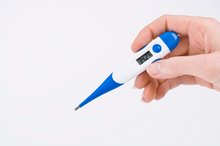What does fact checked mean?
At Healthfully, we strive to deliver objective content that is accurate and up-to-date. Our team periodically reviews articles in order to ensure content quality. The sources cited below consist of evidence from peer-reviewed journals, prominent medical organizations, academic associations, and government data.
The information contained on this site is for informational purposes only, and should not be used as a substitute for the advice of a professional health care provider. Please check with the appropriate physician regarding health questions and concerns. Although we strive to deliver accurate and up-to-date information, no guarantee to that effect is made.
Dry, Cracked Lips in Children
Dry, cracked lips are generally just an annoyance, but they can be a sign of a more serious medical condition in children. Understanding the different chapped-lip causes and their accompanying symptoms can help you determine if your child simply needs a better lip ointment or a trip to the doctor's office.
Common Causes
Dehydration commonly causes dry, cracked lips in children 1. When your child doesn't drink enough liquids, or he loses liquids through vomiting or diarrhea, dehydration may occur. Additional signs of dehydration include:
- fever
- fatigue
- less frequent urination
- dry skin
- dry mouth
- sunken eyes
- cites Drugs.com 1
Allergies and windy weather can also cause your child's lips to become dry and cracked. Lip-licking also causes lips to chap. He may also experience dry or cracked lips if he breaths through his mouth, instead of his nose.
- Dehydration commonly causes dry, cracked lips in children 1.
- Additional signs of dehydration include: * fever
* fatigue
* less frequent urination
* dry skin
* dry mouth
* sunken eyes
* cites Drugs.com 1 Allergies and windy weather can also cause your child's lips to become dry and cracked.
Kawasaki Disease
Kids' Vitamins to Boost the Immune System & Fight Colds
Learn More
Kawasaki disease causes red, dry, cracked lips, which may bleed 3. In Kawasaki disease, the blood vessels, especially those around the heart, become inflamed throughout the body 3. The disease causes a fever that lasts for at least one week, and does not respond to antibiotics. Kawasaki disease primarily affects children under 14, with 80 percent of cases in children under the age of 4 3. The symptoms change as the disease progresses. Early symptoms include red eyes, red and spotted tongue, red and swollen hands and feet, rashes and swollen lymph nodes. Heart complications and an abnormal liver test may also occur in the first one to 11 days. Most cases of Kawasaki disease resolve themselves within four to eight weeks, says the New Zealand Dermatological Society Incorporated 3.
Treatment
You can treat most cases of dehydration at home. Give your child a store-bought oral electrolyte solution for children for 24 hours. Give the solution slowly, in doses of no more than 1 tbsp. every one to two minutes if she's been vomiting, according to Drugs.com. Once rehydrated, you can slowly introduce normal foods if your child has stopped vomiting. Your doctor will treat Kawasaki disease with antibiotics to kill any infection 3. Your doctor will focus on stopping the fever and possible inflammatory complications.
- You can treat most cases of dehydration at home.
- Once rehydrated, you can slowly introduce normal foods if your child has stopped vomiting.
Prevention
104 Fever in a Toddler
Learn More
Drinking plenty of fluids to stay hydrated is one of the best ways to prevent dry, cracked lips. Your child should also wear a lip balm containing sunscreen and petrolatum or beeswax. When your child goes outside in cold weather, he should reapply the lip balm and cover his lips with a scarf, says MayoClinic.com 2. Explain to your child that licking his lips only makes it worse. If he feels the need to moisten to his lips, he should reach for his lip balm, instead. At home, a humidifier can moisten the air.
- Drinking plenty of fluids to stay hydrated is one of the best ways to prevent dry, cracked lips.
- If he feels the need to moisten to his lips, he should reach for his lip balm, instead.
Warnings
If at-home treatment doesn't heal your child's lips, contact your doctor, as there may be an underlying medical condition. If you suspect Kawasaki disease, immediately contact your doctor 3. Dehydration can be very serious in babies 1. If you notice any signs of dehydration in a baby younger than 6 months, or if the baby has vomiting or diarrhea, seek medical care immediately. Additionally, if a dehydrated child of any age has a fever, a very dry mouth, wrinkled skin, blood in her vomit or diarrhea, sunken eyes, no tears when she cries or sunken spot atop her head, contact your doctor immediately.
- If at-home treatment doesn't heal your child's lips, contact your doctor, as there may be an underlying medical condition.
- Additionally, if a dehydrated child of any age has a fever, a very dry mouth, wrinkled skin, blood in her vomit or diarrhea, sunken eyes, no tears when she cries or sunken spot atop her head, contact your doctor immediately.
Related Articles
References
- Drugs.com: Dehydration in Children
- MayoClinic.com: Chapped Lips: What's the Best Remedy?
- DermNet NZ: Kawasaki Disease
- Denby KJ, Clark DE, Markham LW. Management of Kawasaki disease in adults. Heart. 2017;103(22):1760-1769.doi:10.1136/heartjnl-2017-311774
- Agarwal S, Agrawal DK. Kawasaki disease: etiopathogenesis and novel treatment strategies. Expert Rev Clin Immunol. 2017;13(3):247-258.doi:10.1080/1744666X.2017.1232165
- American Heart Association. What is Kawasaki Disease? Updated 2017.
- Bang JS, Kim GB, Kwon BS, et al. Long-term prognosis for patients with Kawasaki Disease complicated by large coronary aneurysm (diameter ≥6 mm). Korean Circ J. 2017;47(4):516-522.doi:10.4070/kcj.2016.0163
- Harahsheh AS, Dahdah N, Newburger JW, et al. Missed or delayed diagnosis of Kawasaki Disease during the 2019 novel coronavirus disease (COVID-19) pandemic. J Pediatr. 2020;April 23.doi:10.1016/j.jpeds.2020.04.052
- Centers for Disease Control and Prevention. Kawasaki Disease. Updated October 24, 2018.
Writer Bio
Ivy Morris specializes in health, fitness, beauty, fashion and music. Her work has appeared in "Sacramento News and Review," "Prosper Magazine" and "Sacramento Parent Magazine," among other publications. Morris also writes for medical offices and legal practices. She holds a Bachelor of Arts in government-journalism from Sacramento State University.









